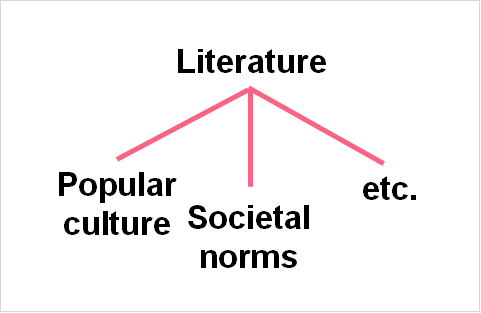Why is the purpose of literature?
In order to answer this question, let’s define our terms. What is literature and, specifically, what is English literature? Literature as defined by the Encyclopaedia Britannica is quite simply a ‘body of written works.’ This includes works defined in the table below.
| Novel |
A narrative in prose |
| Novella |
A narrative in prose that is shorter than a novel |
| Play |
A piece of dramatic literature, which is performed |
| Short Story |
A narrative in prose that is shorter than a novella |
| Poem |
Uses figurative language and sometimes has a rhyme |
English literature is still literature - however, it is any work specific to the British Isles that was written anywhere between the 7th century and the present day. So, when you take any English literature courses, keep in mind that you will be narrowing your study to English literature books. Take a look at the timeline below to see some notable works!  As you might have guessed, English literature is considered as different from literature in the English language. The table below holds some other types of literature in the English language.
As you might have guessed, English literature is considered as different from literature in the English language. The table below holds some other types of literature in the English language.
| American literature |
Literature from the US |
| Canadian literature |
Literature from Canada (non-French) |
| Australian literature |
Literature from Australia, including Aboriginal English |
| New Zealand literature |
Literature form New Zealand |
So now, what is the purpose of literature? Specifically, English literature? Without literature, there is no history. Not only did early works of literature provide first-hand accounts of historical events, but they also capture entire eras: popular culture, societal norms, and more. 
How does literature affect our life?
If you’ve ever been interested in pursuing an English literature degree or want to find an English literature university specialization - you might be asking yourself this question. Let’s start by looking at the different categories of literature:  Within these categories, you can find the following genres:
Within these categories, you can find the following genres:
| Fiction |
Short stories, myths, novels, novellas |
| Non-Fiction |
Autobiographies, speeches, essays, diaries |
| Drama |
Comedies, tragedies, pantomimes, melodramas |
| Poetry |
Poems, pastorals, lyrics |
So, let’s start with something the majority of people can relate to: lyrics. There is a reason why heart-wrenching ballads are so great to listen to during a bad breakup, or why certain songs can take you back to a moment in your life. Songs are the soundtrack to our lived experiences, and the techniques employed by lyricists can be considered literary techniques.  You’ll find literature in the present day affects our lives mainly as a means of entertainment: from classic plays to binge-worthy series to stories shared at the dinner table. While this may seem like a modern-day tendency, the truth is literature has always been a means of entertainment.
You’ll find literature in the present day affects our lives mainly as a means of entertainment: from classic plays to binge-worthy series to stories shared at the dinner table. While this may seem like a modern-day tendency, the truth is literature has always been a means of entertainment.
| Greek Tragedies |
5th century |
Euripides, Sophocles, Aeschylus |
| Shakespeare Plays |
17th century |
Tragedy, tragicomedy comedy |
| Netflix Series |
20th, 21st century |
Films, series, etc. |
Literature also affects language. When it comes to English literature especially, Shakespeare is said to have contributed about 1,700 words and about 40 different phrases to the English language. Take a look at some below!
| Words Invented |
Phrases |
| Laughing stock |
Eyeball |
| Dead as a doornail |
Puking |
| Fair play |
Obscene |
| In a pickle |
Marketable |
What can literature teach us?
Keeping in mind that all of these questions could be answered differently depending on who you ask, we can generally split the teachings of literature into three main categories.  Let’s explore each of these categories in-depth.
Let’s explore each of these categories in-depth.
| Personal |
In the form of catharsis, as a kind of therapy, gives you insight into personal events in your own life, etc. |
| World events |
Historical accounts of socio-cultural and economic events throughout history (i.e., 2008’s Great Recession, the Zoot Suit riots, etc.) |
| Hard and soft skills |
Can give you detailed instruction on a variety of topics: programming, directing, communication, etc. |
In other words, literature can teach us about ourselves, about the world and about a wide variety of skills.
What are the benefits of studying English literature?
The benefits of studying English literature can be divided depending on the type of person who is studying. If you’re a student who isn’t interested in specializing in, for example, an English literature Cambridge program - you might be more interested in knowing how to revise for English literature. If you’re interested in studying English at uni, you might be more interested in English literature graduate jobs. Let’s start with the first case The benefits of studying and reviewing English literature for your class, even if you’re not particularly passionate about literature itself, are many.
| Benefit 1 |
Develop critical thinking skills |
| Benefit 2 |
Improve writing skills |
| Benefit 3 |
Keeps the brain stimulated |
While the above are benefits everyone can take advantage of, let’s take a look at the benefits of being an English literature major.
| Benefit 1 |
Can help you stand out in any industry |
| Benefit 2 |
Can be used as a creative outlet |
| Benefit 3 |
Opens up a wide variety of careers (translator, writer, editor, etc.) |
What skills do you gain from studying English literature?
Now that we’ve talked about the influence that literature can have on personal and professional life, let’s discuss the benefits of studying literature. In other words, the importance of literature review with regards to building skills. When you talk about the skills gained from studying English literature, it is necessary to look at the common assignments you’ll have to complete that will help you perfect these skills.
| Assignment |
Description |
| Research Paper |
English literature courses will require you to complete some sort of research paper. This includes: argumentative, critical, persuasive, etc. |
| Terms |
You will need to study and understand the literary terms used the most: metaphor, hyperbole, ekphrasis, climax, alliteration. |
| Tools |
You will need to study and understand the literary devices used in literature: allegory, epigraph, foreshadowing, juxtaposition, etc. |
| Reading |
In any English literature class you will have to complete reading assignments. |
When you’re studying literary terms and devices, reading books and completing research papers - you are actually polishing skills that will become very useful in the future. Take a look at just some of the skills you will develop while completing any of these four elements. 


 As you might have guessed, English literature is considered as different from literature in the English language. The table below holds some other types of literature in the English language.
As you might have guessed, English literature is considered as different from literature in the English language. The table below holds some other types of literature in the English language. 
 Within these categories, you can find the following genres:
Within these categories, you can find the following genres:  You’ll find literature in the present day affects our lives mainly as a means of entertainment: from classic plays to binge-worthy series to stories shared at the dinner table. While this may seem like a modern-day tendency, the truth is literature has always been a means of entertainment.
You’ll find literature in the present day affects our lives mainly as a means of entertainment: from classic plays to binge-worthy series to stories shared at the dinner table. While this may seem like a modern-day tendency, the truth is literature has always been a means of entertainment.  Let’s explore each of these categories in-depth.
Let’s explore each of these categories in-depth. 